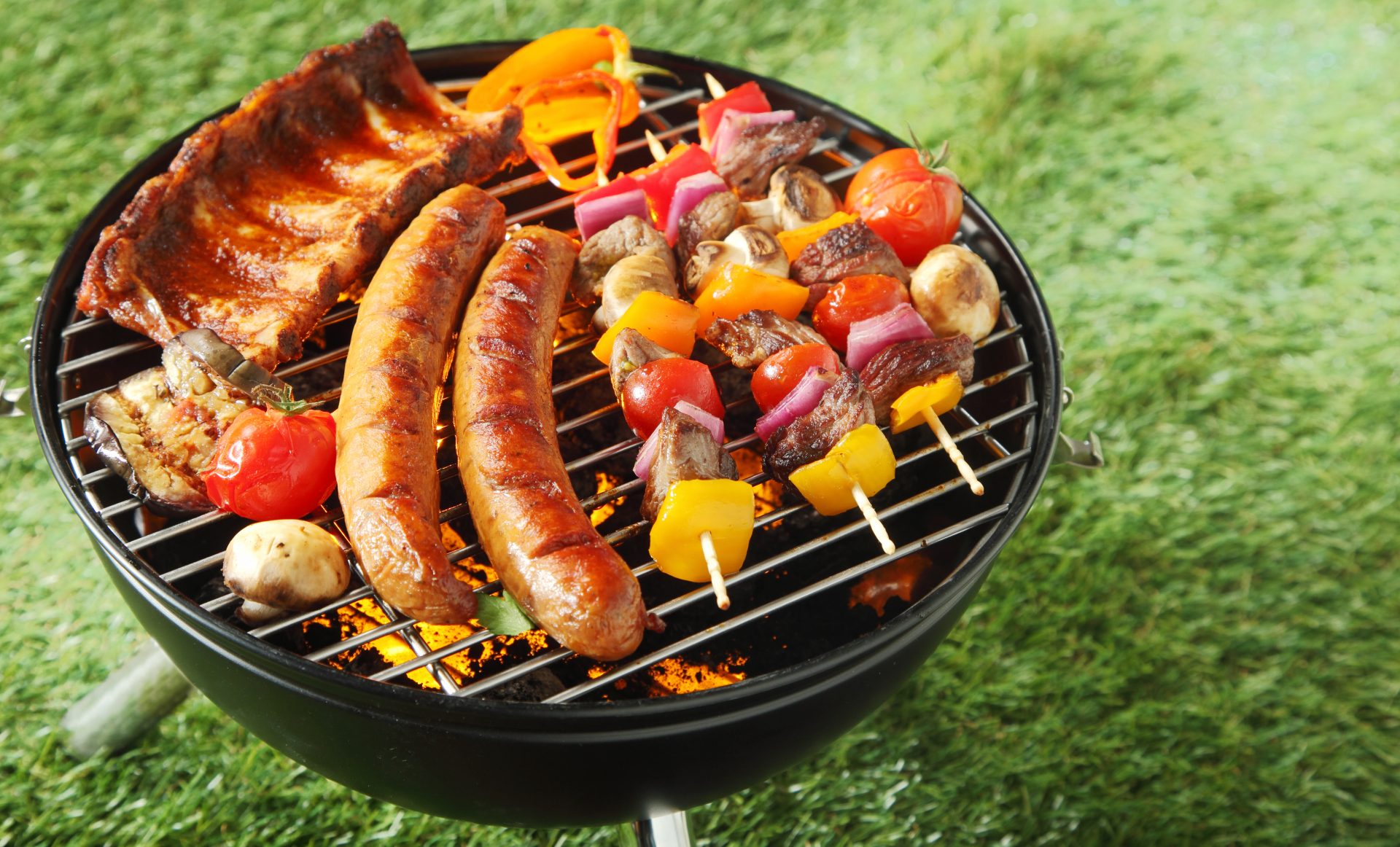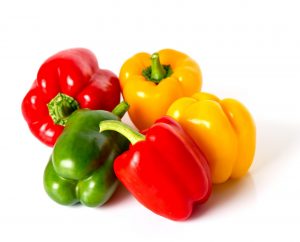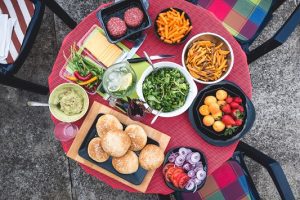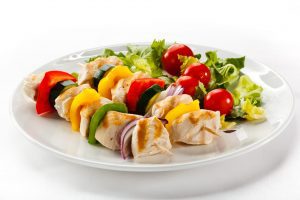
Think grilling season is synonymous with high calorie eats? Think again!
While using practically any cooking method could support the overconsumption of calories, getting out the grill certainly doesn’t have to have this negative halo. And summer (and Labour Day long weekend!) is generally the prime time for grilling, so let’s discuss some tips to make this cooking technique optimal to support your health.
By nature, barbecuing is actually a very health promoting and figure friendly cooking technique to embrace. We love that minimal cooking oil is needed to keep the food from sticking to the grill and excess fat from meats used has the opportunity to drip off the grates; not to mention the food produced is typically absolutely delicious!
But some care must be taken in the methods you use/ what you grill to ensure barbecuing supports you in achieving your health and body composition goals. Whether your menu includes simple burgers or something more elaborate, a little preparation can help you serve up a healthy meal…

- Start out clean. First things first, let’s make sure your grill is in good form to prepare food for you and your guests. Use a wire brush to remove any stuck on food griddles and left-over debris from previous barbecues. To finish off the grill cleaning job, thoroughly wipe it down with a cloth to make sure that no grill-cleaning bristles get into your food. Regarding your food prep area, we recommend keeping this as clean and clutter-free as possible as well. Most importantly, this will minimize the risk of anything unexpected touching or otherwise finding itself in your food, but also contribute to an stress-free & enjoyable cooking experience overall.
- Mise en place. As the French say, but it simply means “have everything ready”. Before you spark the fire, gather everything you need to grill – including food, marinades, utensils, pans, plates, towels, mitts, and a fire extinguisher. By doing a little advance planning and prep work, you’ll spot missing ingredients and utensils before it’s too late, and contribute to a seamless grilling experience.
- Master marinades. There are recipes abound for healthy marinades that will add flavour to whatever you’re grilling – but to maximize flavour while keeping an eye on calories, we suggest you look to create some vinegar based marinades. Starting with a solid vinegar base, adding your favourite herbs and spices (such as thyme, sage, garlic, and pepper) and salt & sweetener to taste makes for a simple and highly flavourful option. If you rely on bottled marinades, choose those that are low in salt and have a fairly simple ingredient list whenever possible.
- Prioritize veggies and fruit. Practically any vegetable can be grilled. Grilling notably intensifies the flavour of fruits and vegetables and is an easy and fun way to increase your produce intake. Kebabs that alternate meat
 with colourful veg (think onions, mushrooms, bell pepper, zucchini, eggplant, and apples), are a great way to add produce. Side note regarding protein choices: for optimally health promoting grilling, and to keep saturated fat and cholesterol low, we suggest you opt for fish – The American Heart Association recommends eating seafood at least twice a week for its cardiovascular benefits. Some heart-healthy options include salmon, trout, and herring, which are all packed with omega-3s. Or you may choose to skip meat altogether once in a while and go for extra firm tofu or a smoked tempeh product on your skewers.
with colourful veg (think onions, mushrooms, bell pepper, zucchini, eggplant, and apples), are a great way to add produce. Side note regarding protein choices: for optimally health promoting grilling, and to keep saturated fat and cholesterol low, we suggest you opt for fish – The American Heart Association recommends eating seafood at least twice a week for its cardiovascular benefits. Some heart-healthy options include salmon, trout, and herring, which are all packed with omega-3s. Or you may choose to skip meat altogether once in a while and go for extra firm tofu or a smoked tempeh product on your skewers.
- Practice safe grilling. If you are using animal proteins, be sure to keep raw meat, poultry, and seafood separate from vegetables and other foods. And to ensure the protein is sufficiently cooked, use a food thermometer to check the internal temperature to ensure it is cook through. Pork, beef, veal, lamb chops, and steaks should be cooked to between 145°F and 160°F. Other meats require a temperature up to 180°F.
- Avoid cross contamination. Always place grilled foods on clean plates, not on the ones that held them when they were raw – to avoid the temptation, set aside unused marinades and extra plates for cooked food to avoid contamination. In addition ensure you use separate marinade products for raw and cooked food. Basting with used marinating liquid is a food illness waiting to happen – any leftover marinade should be promptly thrown out. Though these food safety tips may seem obvious at first read, you’d be surprised how often this important cooking tip is overlooked in the thick of a social cook out.

Grilling outdoors is a great alternative to slaving over a kitchen stove when the weather heats up, but while the grill can sometimes get a bad rap, there are plenty of ways to make a summer cookout health-friendly and hygienic. We encourage you to keep these healthy grilling tips in mind next time you’re looking to bring cooking outdoors.




 with colourful veg (think onions, mushrooms, bell pepper, zucchini, eggplant, and apples), are a great way to add produce. Side note regarding protein choices: for optimally health promoting grilling, and to keep saturated fat and cholesterol low, we suggest you opt for fish – The American Heart Association recommends eating seafood at least twice a week for its cardiovascular benefits. Some heart-healthy options include salmon, trout, and herring, which are all packed with omega-3s. Or you may choose to skip meat altogether once in a while and go for extra firm tofu or a smoked tempeh product on your skewers.
with colourful veg (think onions, mushrooms, bell pepper, zucchini, eggplant, and apples), are a great way to add produce. Side note regarding protein choices: for optimally health promoting grilling, and to keep saturated fat and cholesterol low, we suggest you opt for fish – The American Heart Association recommends eating seafood at least twice a week for its cardiovascular benefits. Some heart-healthy options include salmon, trout, and herring, which are all packed with omega-3s. Or you may choose to skip meat altogether once in a while and go for extra firm tofu or a smoked tempeh product on your skewers.